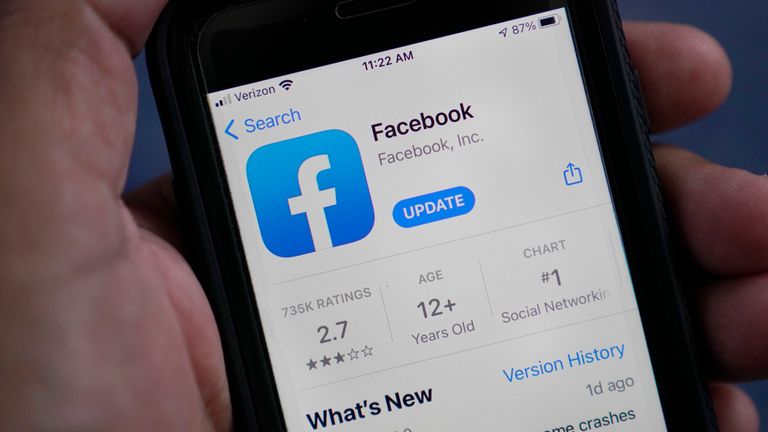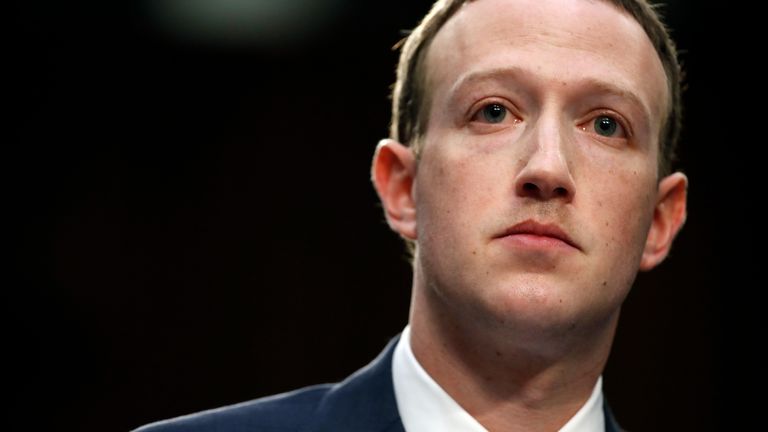For the first time ever, Facebook is short of friends.
The number of people using it each day has declined – the first time this has happened in the social network’s 18-year history.
It still has 1.93 billion users logging in each day, but in its earnings report this week it revealed a drop of nearly 500,000 daily logins during the last three months of 2021.
News of the decline spooked investors, as did the company’s admission that it expects its earnings to be weaker than forecast.
Meta, Facebook’s umbrella company, said it expected its revenues in the first quarter of 2022 to be between $27bn and $29bn, instead of the $30.3bn (£22.3bn) that analysts anticipated. Hardly a big miss, but investors were worried it might be the start of a trend.
That sent Meta’s shares tumbling by more than 25% when markets opened on Thursday, wiping more than $220bn (£162bn) from its value.
Facebook founder Mark Zuckerberg blamed Apple’s recent changes to its iPhone software, which have made it harder for anyone but Apple to track users. Facebook needs our data to send us targeted ads and Apple has cut down on its supply.
Zuckerberg also acknowledged that Meta’s family of social media apps, which includes WhatsApp and Instagram, were facing tough competition from Chinese rival TikTok, which has grabbed the attention of users with its bite-size videos.
Zuckerberg has a plan. He is pushing hard to improve Reels, Instagram’s video product, in order to compete with TikTok, and there is good reason to think this strategy could work – most notably because it’s worked before.
Back in the distant days of the last decade, Zuckerberg’s dominance of social media was threatened by the rise of Snapchat, which pioneered a new form of short-form messaging.
His response was to integrate a strikingly similar kind of short-form messaging into Instagram. Before long, Instagram was riding high again in Western markets, while Facebook continued to make ground around the world.
The other part of the plan looks further ahead. In the long term, Zuckerberg is pinning his hopes on virtual reality. He even renamed his company Meta last year to signal his commitment to the “metaverse”, the virtual world he imagines we’ll all be inhabiting.
He is convinced that, in time, donning a virtual reality headset will be as normal as unlocking a smartphone.
But Facebook’s metaverse is a long way off. Right now, it’s a vision, not a product, a grand dream of a virtual world where everyone can play, work and consume plenty of targeted advertising.
Meta is building the tools to make the metaverse possible, but this involves investing billions in research and development, an activity which further worries investors looking for a steady flow of profits.
Meta’s Reality Labs division, which is in charge of metaverse development, reported losses of $10bn (£7.4bn) last year. Right now, the metaverse looks more like a money pit than a money-maker.
Zuckerberg’s bet is that the investment in virtual worlds will pay off in the long term, proving that he has a broader strategic vision than his panicked shareholders. If he’s right, he’ll also be able to free himself from the control of rivals like Apple and Google, who make the rules for smartphones.
If the metaverse comes to fruition in the way Zuckerberg wants, he’ll own the platform. He’ll be able to dictate the rules.
But Zuckerberg’s grand visions have a habit of evaporating. Last week news filtered out that Facebook’s ambitious plan to build its own cryptocurrency had fallen apart under growing pressure from regulators. The foundation that oversees its development was even reported to be considering a sale of its assets.
Of course, the social media side of Facebook has been under intense scrutiny for years, ever since the Cambridge Analytica scandal emerged in 2017. But throughout all that turmoil it has always been able to count on the stability of its core business.
Now, for the first time ever, it has started to shrink, which means that it needs to innovate more than ever, but it is not at all clear whether it is able to do that.
Facebook’s early motto was, “move fast and break things.” But when you are a global company, with billions of users, it is hard to move fast and breaking things comes with consequences.


